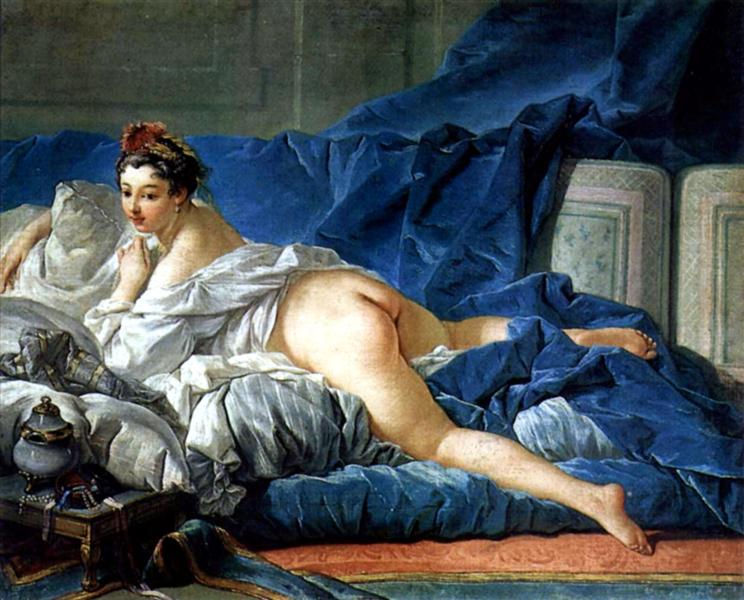Description
La peinture "Odalisca" de François Boucher, créée en 1749, est une œuvre emblématique qui résume l'essence du style Rococó, caractérisée par son exubérance, sa sensualité et une palette de couleurs vibrantes. Ce portrait, qui aborde la figure de l'Odalisca, évoque l'exotique et orientaliste idéaux qui prédominaient dans la peinture européenne de l'époque, souvent associée à une imaginaire de luxe et de plaisir. Dans l'œuvre, Boucher capture une femme allongée dans un environnement intime, entouré de luxe et d'accessoires textiles, ce qui contribue à un sentiment d'opulence caractéristique de son travail.
La composition est séduisante et soigneusement élaborée; La figure de la femme, avec sa possession détendue, occupe l'espace central de l'œuvre, attirant l'attention du spectateur. La forme naturelle et fluide du corps humain, ainsi que l'utilisation d'un contour doux, crée une atmosphère de sensibilité et de sensualité. La position du corps, accentuée par le léger tour de la hanche, et la douceur des lignes, suggèrent un idéal de beauté qui contraste avec la rigidité des conventions artistiques précédentes. De plus, Boucher utilise magistralement la lumière; L'éclairage doux met en évidence les formes féminimales et les plis authentiques du tissu, générant une sensation de volume et de réalisme.
Quant à l'utilisation de la couleur, l'œuvre présente une gamme harmonieuse qui joue avec différentes nuances de bleu, de roses et de tons dorés. Ces couleurs améliorent non seulement la figure de l'Odalisca, mais créent également une atmosphère onirique et presque éthérée, invitant le spectateur à s'immerger dans ce monde des plaisirs visuels. Le contexte de la peinture, orné de riches riches et de détails ornementaux, suggère un espace privé et luxueux, un refuge de la vie quotidienne qui complète le thème sensuel de l'œuvre.
Le contexte historique de la peinture se trouve à l'époque des Lumières, où l'intérêt pour l'exotique et l'orientalisme s'est développé entre les artistes et la haute société. Boucher, un éminent représentant de ce mouvement, peint les femmes non seulement comme un objet de désir, mais comme un symbole d'évasion et de liberté des conventions sociales. Bien qu'il n'y ait pas de caractères supplémentaires qui interagissent directement avec la figure centrale, l'environnement enrichi de l'Odalisca suggère un récit implicite qui évoque un monde de fantaisie et de suggestion.
L'Odalisca de Boucher peut être considérée comme une continuation des traditions de la peinture nue, réinterprétant la figure classique avec les nuances et les préoccupations esthétiques de Rococó. Son accent sur la sensualité et l'ornementation le place en dialogue avec des œuvres contemporaines d'autres peintres de l'époque qui ont également exploré la question des femmes dans des contextes luxueux, comme Jean-Antoine Watteau et plus tard Jean-Honoré Fragonard.
En résumé, "Odalisca" est une œuvre qui transcende la simple représentation du corps féminin. Il devient un véhicule pour explorer non seulement la beauté, mais aussi les complexités du désir et de l'évasion dans la culture du français du XVIIIe siècle. La capacité de Boucher à tisser un récit riche et sensuel, lié à un environnement visuellement captivant, assure sa place comme l'un des grands maîtres de Rococó Art, dont les œuvres continuent de résonner aujourd'hui pour leur célébration audacieuse de la beauté et de la sensualité.
KUADROS ©, une peinture célèbre sur votre mur.
Peintures à l'huile fabriquées à la main, avec la qualité des artistes professionnels et le sceau distinctif de KUADROS ©.
Service de reproduction des images avec garantie de satisfaction. Si vous n'êtes pas complètement satisfait de la réplique de votre peinture, nous remboursons votre argent à 100%.

